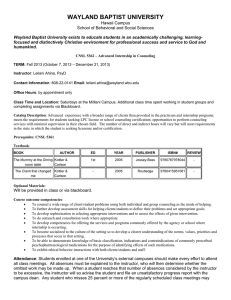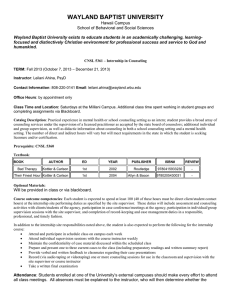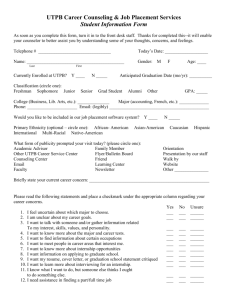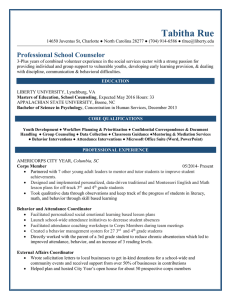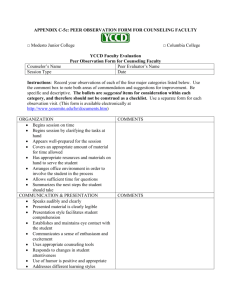WAYLAND BAPTIST UNIVERSITY
advertisement
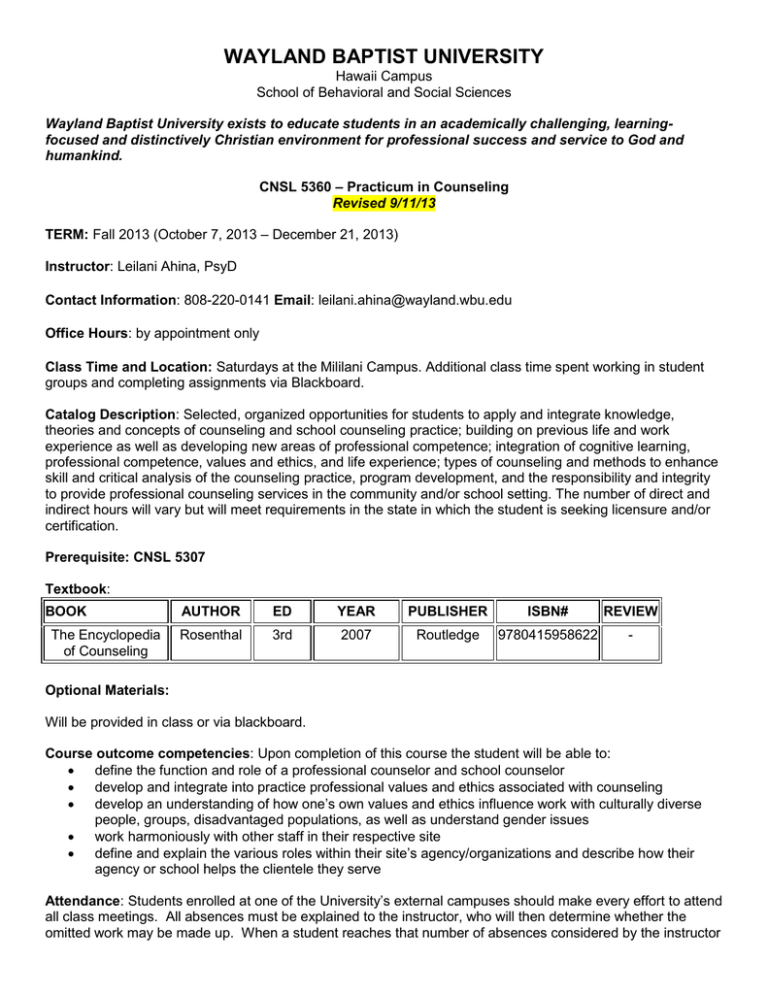
WAYLAND BAPTIST UNIVERSITY Hawaii Campus School of Behavioral and Social Sciences Wayland Baptist University exists to educate students in an academically challenging, learningfocused and distinctively Christian environment for professional success and service to God and humankind. CNSL 5360 – Practicum in Counseling Revised 9/11/13 TERM: Fall 2013 (October 7, 2013 – December 21, 2013) Instructor: Leilani Ahina, PsyD Contact Information: 808-220-0141 Email: leilani.ahina@wayland.wbu.edu Office Hours: by appointment only Class Time and Location: Saturdays at the Mililani Campus. Additional class time spent working in student groups and completing assignments via Blackboard. Catalog Description: Selected, organized opportunities for students to apply and integrate knowledge, theories and concepts of counseling and school counseling practice; building on previous life and work experience as well as developing new areas of professional competence; integration of cognitive learning, professional competence, values and ethics, and life experience; types of counseling and methods to enhance skill and critical analysis of the counseling practice, program development, and the responsibility and integrity to provide professional counseling services in the community and/or school setting. The number of direct and indirect hours will vary but will meet requirements in the state in which the student is seeking licensure and/or certification. Prerequisite: CNSL 5307 Textbook: BOOK The Encyclopedia of Counseling AUTHOR ED YEAR PUBLISHER ISBN# REVIEW Rosenthal 3rd 2007 Routledge 9780415958622 - Optional Materials: Will be provided in class or via blackboard. Course outcome competencies: Upon completion of this course the student will be able to: define the function and role of a professional counselor and school counselor develop and integrate into practice professional values and ethics associated with counseling develop an understanding of how one’s own values and ethics influence work with culturally diverse people, groups, disadvantaged populations, as well as understand gender issues work harmoniously with other staff in their respective site define and explain the various roles within their site’s agency/organizations and describe how their agency or school helps the clientele they serve Attendance: Students enrolled at one of the University’s external campuses should make every effort to attend all class meetings. All absences must be explained to the instructor, who will then determine whether the omitted work may be made up. When a student reaches that number of absences considered by the instructor to be excessive, the instructor will so advise the student and file an unsatisfactory progress report with the campus dean. Any student who misses 25 percent or more of the regularly scheduled class meetings may receive a grade of F in the course. Additional attendance policies for each course, as defined by the instructor in the course syllabus, are considered a part of the University’s attendance policy. Additional instructor attendance policies: Attendance is very important to the outcome of your success in this class. If you are unable to attend a class, it is your responsibility to notify the instructor immediately and to acquire the notes from another student for the class missed. Attendance will be taken and will be factored into students' grade. If you miss class, you should notify the instructor (preferably via e-mail) of your status and reason for missing class. Service for the Disabled: In compliance with the Americans with Disabilities Act of 1990 (ADA), it is the policy of Wayland Baptist University that no otherwise qualified person with a disability be excluded from participation in, be denied the benefits of, or be subject to discrimination under any educational program or activity in the university. The Coordinator of Counseling Services serves as the coordinator of students with a disability and should be contacted concerning accommodation requests at (806) 291- 3765. Documentation of a disability must accompany any request for accommodations. Documentation and Licensing It is strongly encouraged that you review the licensure requirements as a Licensed Mental Health Counselor in the state of Hawaii, including the specific documentation you will need to submit when applying for licensure. Such information can be found at http://hawaii.gov/dcca/areas/pvl/programs/mental/ As stated in the Hawaii licensure application, “your supervisor must be a licensed mental health counselor, psychologist, licensed clinical social worker, advanced practice registered nurse with a specialty in mental health, physician with a specialty in psychiatry, or a marriage and family therapist during the entire supervised period.” Please note that the LMHC Board requires 3000 clock hours of supervised counseling experience after completion of the master's degree. This is referred to as “internship” and is not to be confused with the Internship course required in the graduate program. National Counselor Examination for Licensure and Certification (NCE) The State of Hawaii requires a passing score on the NCE for state credentialing as Licensed Mental Health Counselor (LMHC). The purpose of the NCE is to assess knowledge, skills, and abilities viewed as important for providing effective counseling services. The NCE is designed to be general in nature. It is intended to assess cognitive knowledge which should be known by all counselors regardless of their individual professional specialties. The NCE, administered on the 3rd Saturday in April and October of each year, is comprised of 200 multiple choice questions and is scheduled for a four-hour period beginning at 9:00 a.m. For more information, test dates, and registration deadlines, visit http://www.nbcc.org/. Grading Course grades will be calculated as follows: Assignments Review/study outline for assigned comps exam area DSM-5 summary and presentation Discussion Board Post Week 3: Questions about subject areas Discussion Board Post Week 5 and discussion responses Discussion Board Post Week 10 Case file written portion Case file presentation Attendance, Participation, Timely submission of forms TOTAL Points 15 10 5 15 10 25 10 10 100 points Note: If have not fulfilled your hourly requirements, you must enroll in the course again. You cannot take an “incomplete” for any of the field experience courses (i.e. Practicum, internship, or advanced internship). Course Requirements: 1. Review/study outline for assigned comps exam area On the first day of class you will be assigned an area from the comprehensive exam to review and present to the class. At the second class meeting provide each member of the class with a copy of study materials for this section. Grading will be based on the comprehensive coverage of the material, understandability, and usefulness. 2. Review of assigned DSM-5 area The newly published DSM-5 comes with significant changes and controversy. At the fist class meeting you will be assigned a diagnostic category to research. On 11/23 you will provide the class with a written summary of your research and deliver a short (15-20 minute) presentation on your findings. Your summary should address past and present criteria, highlighting significant changes, and implications for such changes. Provide examples to illustrate your understanding of these criteria changes. Describe comorbidity and differential diagnosis. 3. Discussion Board Post and Responses (on Blackboard) In place of face-to-face class time, we will be reading and discussing readings via three separate Blackboard discussion threads. You will post a response to assigned readings during Week #5 and then read and thoughtfully reply to all classmate's post during week 6. You should read and "moderate" responses to your original post. Topics for these three posts will be formulated at the first class meeting. 4. Case File You are required to videotape a counseling session and assemble a case file for a client with whom you are working. Your video must be at least 30 minutes long. However, we will only have time to review 10 minutes of this tape in class. If your agency or school will not allow for videotaping or if you cannot find a client who will give consent, then you should find someone (such as a friend, or relative, or neighbor, or another classmate) who would be willing to participate. Please discuss this “surrogate client” prior to videotaping with this professor. You will also need a consent to videotape this “surrogate client”. Also, please alter, mask, or blacken out any identifying information on all written documentation to protect and maintain the confidentiality of the client. Please ask your professor during class for clarification on how to do this assignment if you are unsure. You will be graded on your counseling skills, your consideration and understanding of ethical and multicultural issues, your ability to discuss and conceptualize your case, and the quality of your written documentation. The class will view a portion of this video with you and will ask questions, offer feedback and provide suggestions. Be certain that you have the technological capability to play your video in the classroom. The purpose of this assignment is to help you polish your counseling skills. 2a. Your written case file should include the following: Signed consent form Case Conceptualization: a 3-4 page double-spaced summary of the client and their issues using appropriate headings. Include relevant background information, diagnostic impressions on all five DSM axes, and treatment recommendations. I strongly suggest you use the Clinician’s Thesaurus as a tool to complete this portion of the assignment. Transcription of a portion of the counseling session that you plan to show in class. This is to be transcription of the 10 minute segment you plan to show during class and should include a notation of your micro skills used next to each of your responses (this can be handwritten in the margin. For example: open-ended question, reflection, summary, etc.). Progress Note of this session in SOAP or DAP format (1-2 pages double spaced) Self-evaluation: a two-page double-spaced reflection on what you attempted to do in this session, what you did well and what you could have done better 2b. Presentation of case file Your entire presentation, sharing of a 10 minute video clip, and the discussion that follows should take about 30 minutes to complete. 5. Turning in required forms according to the schedule: Proof of insurance, Site agreement form, Experience logs, accrual of minimum required internship hours During each class that we meet, your professor will ask each student to turn in their log to sign off on their hours accrued. The site supervisor should sign off on the student’s hours on a weekly basis. A portion of your grade in this class is determined by your ability to turn in the evaluation forms and log books as scheduled as well as complete the required hours of supervised internship hours (including the minimum number of both direct and indirect client contact hours) as well as your ability to turn in your log book for review at each class meeting time. Your site supervisor’s comments will also be considered as well. You cannot take an “incomplete” for this course because this will prevent you from being able to sign up for the advanced internship course. Therefore, in some unforeseen instance that you will not be able to accrue the required minimum hours, please consult with your professor and/or division chair on how best to address your situation. ATTENDANCE & PARTICIPATION Method of determining course grade: The University has a standard grade scale: A = 90-100, B = 80-89, C = 70-79, D = 60-69, F= below 60, W = Withdrawal, WP = withdrew passing, WF = withdrew failing, I = incomplete. An incomplete may be given within the last two weeks of a long term or within the last two days of a microterm to a student who is passing, but has not completed a term paper, examination, or other required work for reasons beyond the student’s control. A grade of “incomplete” is changed if the work required is completed prior to the last day of the next long (10 to 15 weeks) term, unless the instructor designates an earlier date for completion. If the work is not completed by the appropriate date, the I is converted to an F. Instructor's policy on Academic Dishonesty: Wayland Baptist University’s policy on academic honesty and/or plagiarism will be strictly adhered to in this class. Any plagiarized work will be referred to the Dean and may result in an automatic No Pass grade. Please refer to the Academic Catalog for further information Tentative Schedule: Week # 1 2 Date/Saturdays 10/12/13 Meetings Class Content/Assignments Due 10/19 Class Meets 8am-11am Signed site agreements, proof of insurance documents and Week #1 & 2 logs due Check in and development of learning objectives for the semester Review of comps and licensure requirements Comprehensive exam baseline testing Areas for remedial review assigned Week #2 Logs due 3 10/26 4 11/2 Class Meets 8am-11am Blackboard discussion thread for week 3 due at Midnight: 5 questions to each classmate about their subject area Outlines of assigned review area #1 (from first class meeting) due Check in on learning objectives/site experience Week # 3 and #4 logs due 5 11/9 6 11/16 7 Friday 11/22 Discussion board threads for week 5 due via Blackboard by midnight: Topic TBD Comments/discussion regarding all classmates’ discussion board posts for week #5 posts due by midnight Class Meets 5-9pm Outlines of assigned review area #2 (from first class meeting) due Check in on learning objectives/site experience Week #5, 6, & 7 logs due (Also week 7) Saturday 11/23 8 11/30 9 12/7 10 12/14 11 12/21 Class Meets 9am-3pm Review of assigned DSM-5 area due in class Thanksgiving Holiday – Enjoy!) Comprehensive Exam 8am-12pm Blackboard discussion thread for week #10 due at midnight: Topic TBD Class Meets 9am-5pm Case File Due. Case File Presentations. Week #8, 9 & 10 logs and practicum site evaluations due **SAVE A COPY OF ALL SYLLABI FOR YOUR RECORDS AND FOR POSSIBLE FUTURE SUBMISSION TO LICENSURE BOARDS.
